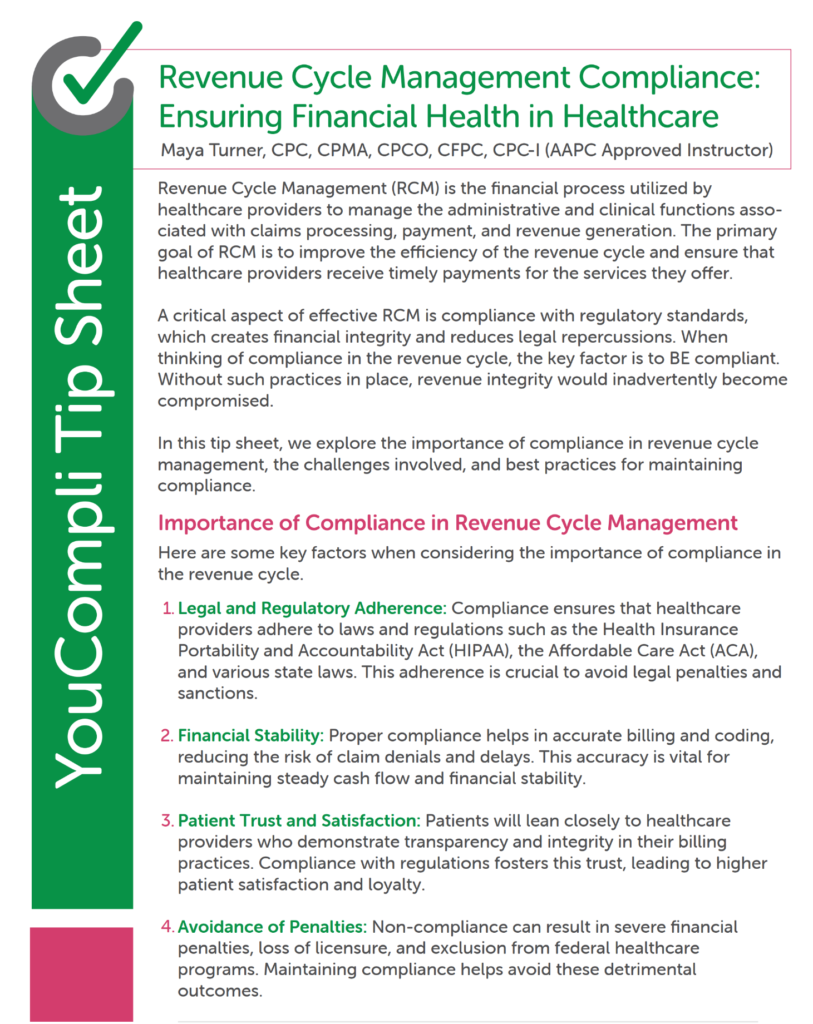
Revenue Cycle Management (RCM) is the financial process utilized by healthcare providers to manage the administrative and clinical functions associated with claims processing, payment, and revenue generation. The primary goal of RCM is to improve the efficiency of the revenue cycle and ensure that healthcare providers receive timely payments for the services they offer.
A critical aspect of effective RCM is compliance with regulatory standards, which creates financial integrity and reduces legal repercussions. When thinking of compliance in the revenue cycle, the key factor is to BE compliant. Without such practices in place, revenue integrity would inadvertently become compromised.
In this tip sheet, we explore the importance of compliance in revenue cycle management, the challenges involved, and best practices for maintaining compliance.
Importance of Compliance in Revenue Cycle Management
Here are some key factors when considering the importance of compliance in the revenue cycle.
- Legal and Regulatory Adherence: Compliance ensures that healthcare providers adhere to laws and regulations such as the Health Insurance Portability and Accountability Act (HIPAA), the Affordable Care Act (ACA), and various state laws. This adherence is crucial to avoid legal penalties and sanctions.
- Financial Stability: Proper compliance helps in accurate billing and coding, reducing the risk of claim denials and delays. This accuracy is vital for maintaining steady cash flow and financial stability.
- Patient Trust and Satisfaction: Patients will lean closely to healthcare providers who demonstrate transparency and integrity in their billing practices. Compliance with regulations fosters this trust, leading to higher patient satisfaction and loyalty.
- Avoidance of Penalties: Non-compliance can result in severe financial penalties, loss of licensure, and exclusion from federal healthcare programs. Maintaining compliance helps avoid these detrimental outcomes.
There could be many more, but the key here is understanding the OIG has put regulations in place for the revenue cycle with good reason. Be sure your organization understands these regulations and has a team in place to review and/or put in place policies that can comply with the revenue cycle.
All of this said, this isn’t easy. It’s understandable to have challenges with becoming compliant. The key is getting professional assistance and trying not to handle such a big task on your own. Just know with compliance there are challenges not only with operations but the overall complexity of getting it within a fluid process.
Challenges in Revenue Cycle Management Compliance
There are four main types of challenges that may occur when aiming to become compliant.
- Complex Regulatory Environment: The healthcare industry is subject to complex federal, state, and local regulations, and they change frequently. Keeping up with these constantly evolving regulations is a significant challenge for healthcare providers. Knowing the granularities associated with these changes is crucial in revenue cycle compliance.
- Data Security: Protecting patient information is paramount, especially with the increasing threat of cyberattacks. Compliance with data protection regulations like HIPAA requires robust security measures and constant vigilance.
- Billing and Coding Accuracy: Accurate medical coding and billing are critical for compliance. Errors in coding can lead to claim denials, audits, and penalties. Having coding compliance professionals and policies in place reduces financial vulnerability. It also ensures accuracy, which in turn requires continuous training and education for coding professionals.
- Resource Constraints: Smaller healthcare facilities often struggle with limited resources, making it challenging to implement comprehensive compliance programs. This limitation can lead to gaps in compliance and increased risk of violations.
When putting together policies or even beginning to understand how to implement compliance within your organization, be certain to understand each department’s function – and make sure they are represented when making decisions. Typically, boards include directors who represent departments that may be affected.
Best Practices for Maintaining Compliance
Let’s look at some other best practices in revenue cycle compliance.
- Regular Training and Education: Continuous training for staff on the latest regulations and compliance requirements is essential. This training should cover coding accuracy, data security, patient privacy, and ethical billing practices. It’s important to know the type of training, if it’s based on a focused need or generalized need based on focused review or deficiency, if needed. Having a diverse coding compliance program and understanding the significant roles of how they interact is especially important.
- Implementing Robust Policies and Procedures: Developing and enforcing clear policies and procedures for all aspects of RCM ensures consistent compliance. These policies should be regularly reviewed and updated to reflect changes in regulations. Understanding and reviewing policies as regulations change is especially important in the ever-changing scope of healthcare and regulations become especially important.
- Utilizing Technology: Leveraging advanced RCM software and tools can enhance accuracy and efficiency. Automated systems can help detect errors, streamline workflows, and ensure adherence to regulatory standards. EMR systems also can help with the appropriate edits, but they do need to be monitored carefully to assist with payer policies. Utilizing this function can be helpful if there is proven viability with its function and programming.
- Conducting Regular Audits: Regular internal and external audits help identify compliance gaps and areas for improvement. These exercises provide an opportunity to correct issues before they escalate into larger problems. A coding compliance and/or revenue integrity team can assist, as they typically follow regulatory standards issued by federal entities. This, in addition to having company policies in place, reduces the risk of an audit.
- Engaging Compliance Experts: Consulting with compliance experts and legal advisors can provide valuable insights and guidance. These professionals can help navigate complex regulations and develop effective compliance strategies. They also are crucial to RCM compliance success because they can help implement improvement plans to help providers and/or facilities comply when submitting for payment.
These best practices may seem daunting at first. But, once implemented, they become worth the effort. Having well-balanced compliance within your organization keeps anxieties low and minimizes surprises relating to queries regarding revenue integrity.
Conclusion
Revenue cycle management compliance is crucial for the financial health and operational success of healthcare providers. By adhering to regulatory standards, ensuring accurate billing and coding, and protecting patient information, healthcare facilities can avoid legal repercussions and maintain patient trust. Implementing best practices such as continuous training, robust policies, and leveraging technology can significantly enhance compliance efforts. A proactive approach to RCM compliance not only safeguards against penalties but also contributes to the overall efficiency and effectiveness of healthcare delivery.
Download PDF Tip Sheet

Maya Turner, CPMA, CPCO, CFPC, CPC, CPC-I, AAPC, is the founder and managing director of Turner Expert Consulting Services. She is a certified professional coder with 30 years of experience in all components of healthcare coding and reimbursement, revenue cycle management, compliance, and inpatient and outpatient billing.

27 Ungated Resources for Compliance Leaders and Teams
Compliance professionals sometimes feel undervalued in comparison to other functions in their organization. They think leaders and colleagues don’t really understand what they do.
These resources will help. Packed with ideas, tips and recommendations, these pieces were written by professionals with many years of compliance experience.
You can quickly skim for articles that relate to your needs and interests. Bookmark this page as a reference for future questions or projects.
Download Maya’s Revenue Cycle Management White Paper




